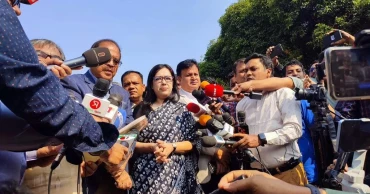resignation
Canadian PM Justin Trudeau resigns in the face of internal, external pressure
Embattled Canadian Prime Minister Justin Trudeau announced his resignation on Monday, citing a desire for new leadership.
His departure marks the end of an era after nearly a decade in office.
Trudeau's resignation comes amid declining approval and internal party pressure. He will remain PM though, till his party is able to choose a new leader.
He said that he has “one regret” as he announced he intends to resign — and that is the country’s election process, according to CNN.
“If I have one regret, particularly as we approach this election — well, probably many regrets that I will think of,” Trudeau said. “But I do wish we’d been able to change the way we elect our governments in this country so that people could simply choose a second choice, or a third choice on the same ballot.”
However, he may remain in office until the summer, depending on how long the ruling Liberal Party takes to select a new leader.
Trudeau’s decision could precede the party's national caucus meeting on Wednesday, according to the Globe and Mail.
Read More: Justin Trudeau likely to resign this week
While Trudeau may seek to host the G7 summit in Alberta this June, his leadership faces mounting pressure. Over half of the 153 Liberal MPs in the House of Commons have called for his resignation, a figure nearing 100.
With Parliament returning on January 27 and a no-confidence motion expected, Trudeau might seek to prorogue Parliament to facilitate the leadership transition.
Hillary Clinton, George Soros and Denzel Washington received the highest US civilian honor
After returning from a holiday in British Columbia, Trudeau has yet to comment publicly, with only a virtual Cabinet meeting scheduled for Monday.
Meanwhile, potential successors include former Deputy Prime Minister Chrystia Freeland, whose resignation in December intensified calls for Trudeau’s departure. Polls suggest Freeland could revive the party’s fortunes, with support rising from 16% under Trudeau to over 20%. Other contenders, including Mark Carney and Melanie Joly, appear less promising. The Conservatives currently lead the Liberals by over 20% in voter preference.
1 year ago
Anti-Discrimination Officers’ Forum demands resignation of 2 Bangladesh Bank deputy governors
The Anti-Discrimination Officers Forum of Bangladesh Bank has demanded the immediate resignation of two deputy governors, Nurun Nahar and Dr. Habibur Rahman, accusing them of involvement in corruption.
The forum claims these officials were appointed under the Awami League government and are perpetuating malpractice in the institution.
In a letter addressed to the central bank's governor, Dr. Ahsan H. Mansur, on Wednesday, said that the continued presence of these individuals—closely tied to corruption—undermines the integrity of Bangladesh Bank.
The letter went on to accuse Nurun Nahar and Dr. Habibur Rahman of being "deputy governors of bank robbers," demanding that they step down to avoid further damage to the institution's credibility.
Read: Bangladesh Bank server tech glitch disrupts inter-bank cheque clearing
The platform also raised concerns about the upcoming "BB Night," an event organized by the Bangladesh Bank Officers Council scheduled for October 20. The forum urged Governor Mansur not to attend the event, citing it as a continuation of the council’s alleged favoritism and political bias.
The forum highlighted that other high-ranking officials, including a former governor, two deputy governors, the chief of the Bangladesh Financial Intelligence Unit (BFIU), and a policy advisor, have already been forced to resign under similar allegations of corruption.
Read more: Bangladesh Bank Governor has assured liquidity crisis resolution for pvt banks: Abdul Awal Mintoo
1 year ago
Resignation of 3 technocrat ministers, 3 advisers accepted
The resignation letters of three technocrat ministers and three advisers to the Prime Minister of Bangladesh have been accepted.
The Cabinet Division issued a notification in this regard on Wednesday (November 29, 2023).
The three technocrat ministers-- Posts, Telecommunications Minister Mustafa Jabbar, Science and Technology Minister Yeafesh Osman and State Minister for Planning Dr Shamsul Ala —resigned from their respective posts on November 19.
Process on to accept resignations of 3 technocrats in cabinet, 4 PM's advisers
Besides, Prime Minister’s Economic Affairs Adviser Dr Mashiur Rahman, Energy Adviser Dr Tawfiq-e-Elahi Chowdhury and International Affairs Adviser Dr Gowher Rizvi also resigned from their respective posts on the same day.
PM helms science, telecom ministries quit by technocrats
After resignation of the three technocrat ministers, now there are 44 cabinet members except the Prime Minister and of them 23 are ministers, 18 are state ministers and three are deputy ministers.
On November 15, Kazi Habibul Awal, Chief Election Commissioner announced that the national election will be held on January 7.
Resignation of 4 technocrat ministers accepted; gazette published
2 years ago
By-polls to 5 vacant seats: AL to start distributing application forms Wednesday
Awami League will start distributing application forms from Wednesday for the party’s nomination in elections to five parliamentary seats, left vacant after BNP MPs resignation.
By-polls to the five parliamentary seats will be held on February 1 next year.
Read more: By-elections to 5 vacant seats of BNP MPs on Feb 1, 2023
The aspirants were asked to collect and submit the forms from Prime Minister Sheikh Hasina’s Dhanmondi political office from 10.30am to 4.30pm on December 28-31, said an AL press release.
The aspirants also asked to maintain health protocols and not to make crowd during the collection and submission of the application froms.
The aspirants have to bring the photocopy of their respective national identity cards to collect the nomination forms.
The Election Commission (EC) announced the schedule of the by-elections on December 18.
Read more: 5 parliamentary seats now vacant after BNP MPs’ resignation: Speaker
EC will conduct the by-polls to parliamentary seats -- Thakurgaon-3, Bogura-4, Bogura-6, Chapainawabganj-2 and Brahmanbaria-2.
The EC secretary said candidates can submit their nomination papers till January 5. Returning officers will scrutinize the nomination papers on January 8 and January 15 has been set as the last date for withdrawal of candidature.
3 years ago
BNP MP Harunur Rashid submits resignation to JS Speaker
Md. Harunur Rashid, Member of Parliament (MP) of Chapainawabganj-3, tendered his resignation to Speaker of Parliament Dr Shirin Sharmin Chaudhury on Thursday.
On December 11, five of seven MPs of BNP resigned as part of the party’ anti-government movement with a 10-point demand that include dissolution of parliament.
The MPs who resigned in person were Md. Zahidur Rahman, Thakurgaon-3; Md. Mosharof Hosen, Bogura-4; Gulam Mohammad Siraj, Bogura-6; Md. Aminul Islam, Chapainawabganj-2 and Rumeen Farhana, Women’s Reserved Seat.
Md. Harunur Rashid, who was in Australia and ailing MP of Brahmanbaria-2 Abdus Sattar Bhuiyan could not submit resignation to the Speaker on that day.
Speaking to the reporters at the Jatiya Sangsad today, Harunur Rashid said there is no scope for the Speaker to deny to accept the resignation letter.
“But the speaker told me that there is an opportunity to present the party’s demands in parliament if I don’t resign.”
Read more: 5 parliamentary seats now vacant after BNP MPs’ resignation: Speaker
“But there is no such opportunity anymore as six BNP MPs have already resigned,” he added.
He also said, “You all know that only seven were elected from BNP in parliament that was formed through the dubious election in 2018. At that time we joined parliament on the instruction of our acting chairman and even today we are resigning as per the right decision of the acting chairman.”
He also said reformation of constitution and laws along with neutral government is needed for holding a fair election.
Harunur Rashid also demanded the release of BNP’s top leaders and activists who were arrested ‘in false and fabricated cases’ following Nayapaltan clash on December 7.
On December 10, BNP’s international affairs secretary Rumeen Farhana announced the decision of the resignation of the party’s MPs from its Golapbagh rally. The MPs sent their resignation through an email on the same day.
The party also unveiled a 10-point charter of demands from Golapbagh rally aimed at unseating the government through a simultaneous movement.
Meanwhile, the Parliament Secretariat published a gazette notification announcing the five parliamentary seats as vacant after their resignation.
Read more: BNP MPs' decision to resign a 'mistake': Obaidul Quader
The by-elections to the five vacant parliamentary seats of the BNP MPs will be held on February 1, announced Election Commission (EC) on December 18.
EC will conduct the by-polls to parliamentary seats- Thakurgaon-3, Bogura-4, Bogura-6, Chapainawabganj-2 and Brahmanbaria-2.
3 years ago
5 BNP MPs submit resignation to JS Speaker
Five out of seven BNP members of the parliament (MPs) submitted their resignation to Speaker of the Parliament Dr Shirin Sharmin Chaudhury on Sunday, as part of their anti-government movement with a 10-point demand that includes dissolution of parliament.
The BNP MPs submitted their resignation letters at 12:20 pm, Mohammad Siraj, MP of Bogura-6, told UNB.
The MPs who resigned are: Md. Zahidur Rahman, Thakurgaon-3; Md. Mosharof Hosen, Bogura-4; Gulam Mohammad Siraj, Bogura-6; Md. Aminul Islam, Chapainawabganj-2 and Rumeen Farhana, from women’s reserved seats.
Read more: BNP declares start of ‘simultaneous anti-govt movement’ on Dec 24
Md. Harunur Rashid of Chapainawabganj-3, who is now in Australia and ailing MP of Brahmanbaria-2 Abdus Sattar Bhuiyan could not submit resignation to the Speaker today.
They will tender their resignation later as they have to submit it in person as per the constitution, said Mohammad Siraj.
Speaking to reporters at the Jatiya Sangsad, BNP’s international affairs secretary Rumeen said they submitted their resignation to the Speaker following their demand for dissolution of parliament.
“This is just the beginning. Now the other MPs from different political parties who support democracy should also come forward and resign,” she added.
Read more: BNP activists, locals complain of internet service disruption in and around Golapbagh rally venue
Earlier, Rumeen Farhana announced the decision from the party’s Golapbagh rally on Saturday.
The MPs sent their resignation through an email on Saturday.
BNP on Saturday unveiled a 10-point charter of demands from Golapbagh rally aimed at unseating the government through a simultaneous movement.
3 years ago
BNP MPs to submit their resignation to Speaker of Parliament today
All seven BNP Members of Parliament (MPs) will physically submit their resignation to speaker of Parliament on Sunday.
The BNP MPs will submit their resignation letters around 11am, according to BNP sources.
Read more: BNP declares start of ‘simultaneous anti-govt movement’ on Dec 24
BNP’s international affairs secretary Rumeen Farhana announced the decision from the party’s Golapbagh rally on Saturday.
The MPs who resigned are: Md. Zahidur Rahman, Thakurgaon-3; Md. Mosharof Hosen, Bogura-4; Gulam Mohammad Siraj, Bogura-6; Md. Aminul Islam, Chapainawabganj-2; Md. Harunur Rashid, Chapainawabganj-3; Abdus Sattar Bhuiyan, Brahmanbaria-2; and Rumeen Farhana, Women’s Reserved Seat.
Read more: BNP’s divisional rally: Heightened security in and around Dhaka
The MPs sent their resignation through an e-mail on Saturday.
3 years ago
Truss resignation: UK’s political, economic turmoil far from over
British Prime Minister Liz Truss quit Thursday after a tumultuous and historically brief term in which her economic policies roiled financial markets and a rebellion in her political party obliterated her authority.
Truss became the third Conservative prime minister to be toppled in as many years, extending the instability that has shaken Britain since it broke off from the European Union and leaving its leadership in limbo as the country faces a cost-of-living crisis and looming recession.
“I cannot deliver the mandate on which I was elected by the Conservative Party,” Truss acknowledged in a statement delivered outside her 10 Downing Street office.
Financial markets breathed a sigh of relief, but Truss leaves a divided party seeking a leader who can unify its warring factions. Truss, who said she will remain in office until a replacement is chosen, has been prime minister for just 45 days and will almost certainly become the shortest-serving leader in British history.
The ruling Conservative Party said it would choose a successor by the end of next week. Potential contenders include former Treasury chief Rishi Sunak, who lost to Truss in the last leadership contest, House of Commons leader Penny Mordaunt, Defense Secretary Ben Wallace — and Boris Johnson, the former prime minister ousted in July over a series of ethics scandals.
The low-tax, low-regulation economic policies that got Truss elected proved disastrous in the real world at a time of soaring inflation and weak growth.
Her Sept. 23 economic plan included a raft of tax cuts — paid for by government borrowing — that investors worried Britain couldn’t afford. That pummeled the value of the pound and drove up the cost of mortgages, causing economic pain for people and businesses already struggling from an economy yet to emerge from the pain of the pandemic.
That tumult resulted in the replacement of Truss’ Treasury chief, multiple policy U-turns and a breakdown of discipline in the governing Conservative Party.
Truss bowed out just a day after vowing to stay in power, saying she was “a fighter and not a quitter.” But she couldn’t hold on any longer after a senior minister quit her government with a barrage of criticism and a vote in the House of Commons descended into chaos and acrimony just days after she was forced to abandon many of her economic policies.
The pound rose about 1% Thursday to around $1.13 after Truss’ resignation.
But where the Conservative Party goes from here is not clear. Party chiefs hope lawmakers can rally around a unity candidate, but that seems unlikely in a party whose myriad factions — from hard-right Brexiteers to centrist “One Nation” Tories — are at each other’s throats.
“Nobody has a route plan. It’s all sort of hand-to-hand fighting on a day-to-day basis,” Conservative lawmaker Simon Hoare told the BBC on Thursday before Truss resigned.
Read: Pound rises against dollar as investors react to UK PM Truss' resignation
“It’s time for the prime minister to go,” Conservative lawmaker Miriam Cates said, echoing the sentiments of many others.
Newspapers that usually support the Conservatives were vitriolic. An editorial in the Daily Mail on Thursday was headlined: “The wheels have come off the Tory clown car.”
Her downfall was so rapid that the party was unable to spell out exactly how the selection of a new leader would unfold, and whether the party’s 172,000 members, or only its 357 lawmakers, would get a say. The new leader is due to be in place by Oct. 28.
Truss’ resignation is the culmination of months of simmering discontent inside the Conservative Party as its poll ratings with the public have plunged.
Johnson’s government was revealed to have held a series of parties in government buildings during period of coronavirus lockdown, when people in Britain were barred from mingling with friends and family or even visiting dying relatives.
The party spent the summer picking a replacement as the economy worsened amid spiking energy prices triggered by Russia’s invasion of Ukraine.
Against that backdrop, many people — including many Conservatives — felt Truss’ tax-cutting policies would do little to help ordinary people struggling to make ends meet.
Whoever succeeds Truss will become the country’s third prime minister this year. A national election doesn’t have to be held until 2024, but opposition parties demanded one be held now, saying the government lacks democratic legitimacy.
Opposition Labour Party leader Keir Starmer accused the Conservatives of presiding over “utter chaos.”
“This is doing huge damage to our economy and the reputation of our country,” he said. “We must have a chance at a fresh start. We need a general election – now.”
Truss’ political unraveling began after she and her Treasury chief, Kwasi Kwarteng, unveiled an economic plan with 45 billion pounds ($50 billion) in unfunded tax cuts. That hammered of the value of the pound and increased the cost of U.K. government borrowing. The Bank of England was forced to intervene to prevent the crisis from spreading to the wider economy and putting pension funds at risk.
Read: Temporary ban on tourism at Rowangchhari and Ruma to fight ‘militants and criminals’
Truss then fired Kwarteng, and his replacement, Hunt, scrapped almost all of Truss’ tax cuts, along with energy subsidies and her promise of no public spending cuts. He said the government will need to save billions of pounds and there are “many difficult decisions” to be made before he sets out a medium-term fiscal plan on Oct. 31.
Speaking to lawmakers for the first time since the U-turn, Truss apologized Wednesday and admitted she had made mistakes during her six weeks in office, but insisted that by changing course she had “taken responsibility and made the right decisions in the interest of the country’s economic stability.”
Still, Truss said she would not resign — a resolve that was short-lived. Within hours a senior Cabinet minister, Home Secretary Suella Braverman, quit, blasting Truss in her resignation letter, saying she had “concerns about the direction of this government.”
For many Conservative lawmakers, the final straw was a Wednesday evening vote over fracking for shale gas that produced chaotic scenes in Parliament, with party whips accused of using heavy-handed tactics to gain votes.
Chris Bryant, a lawmaker from the opposition Labour Party, said he “saw members being physically manhandled ... and being bullied.” Conservative officials denied this.
Truss’ departure on Thursday sparked jubilation for the tabloid Daily Star, which has set up a livestream featuring a photo of the prime minister beside a head of lettuce to see which would last longer.
“This lettuce outlasted Liz Truss!” it proclaimed Thursday.
While many Britons joined the world in laughing at the lettuce joke, Bronwyn Maddox, director of international affairs think-tank Chatham House, said “there is no question that the U.K.’s standing in the world has been severely battered by this episode and by the revolving door of prime ministers.”
She said Truss’ successor would need to have policies “based on economic stability, but need also to include a resolution of the relationship with Europe; much of the upheaval represents the bitter aftermath of Brexit.”
3 years ago
‘A cautionary tale’: World reacts to UK PM Truss’ resignation
The UK's economic and political turmoil over the past few weeks - culminating in nearly all of Liz Truss's original finance plans now being axed - has been watched around the world.
It is rare for close allies to comment on each other's key policies at home - and if they do, it's unlikely to be an outright criticism.
But at the weekend US President Joe Biden weighed in, saying Ms Truss's original plan was a "mistake" and it was "predictable" that she would have to backtrack.
"I wasn't the only one that thought it was a mistake," Mr Biden said. "I disagree with the policy, but that's up to Great Britain."
The EU's economy chief, meanwhile, said there were "lessons to learn" from what is happening in the UK.
"What happened shows how volatile is the situation and so how prudent we should be also with our fiscal and monetary mix," said Paolo Gentiloni on Friday after Ms Truss fired ex-Chancellor Kwasi Kwarteng.
The world's media has been far more brutal.
"Liz Truss, who's been the British PM for barely six weeks, has managed to drag her party and her country into a debacle the depth of which the country has never before sunk to. And less so at such speed," says an editorial in Colombian daily El Colombiano.
Its headline suggests what the PM might be known for: "Liz Truss the Brief?"
"Clinging to her ideology, far removed from the reality facing the country, Truss exemplifies to perfection what it means to go against common sense when steering the politics of a country."
Meanwhile, the UK is becoming a "cautionary tale" about the effect of "bad politics", said an editorial in Indian daily newspaper The Hindu on Monday.
The newspaper - a widely-read English-language paper and generally critical of right-leaning political parties - said Ms Truss was "once seen as a new hope for breathing life back" into the UK Conservative Party.
Read: Pound rises against dollar as investors react to UK PM Truss' resignation
But now she may have added the "label of 'incompetence' to the Tory governance image", it adds.
Russia's media speculates over Ms Truss's future, reporting that she might be out of her post soon.
"Embarrassment for Liz", said the state-owned daily Rossiyskaya Gazeta on Monday.
"Yet another political crisis is looming over Britain: the newly minted prime minister, Liz Truss, may be forced out of her Downing Street residence already in the coming days and weeks," it says.
"The Tory leader's unpopularity in party circles and in British society has long been known, but now the [prime] minister has come close to the end of her scandalous career."
China's state media also heaped on further criticism. "The outside world does not seem optimistic about the turnaround of the Truss government," said state-run news agency China News Service on Friday.
The Global Times said Truss's position remained unstable because of "continued negative reviews".
But some online media, including Shenniao Zhixun, a blog run in south-west China, noted that the new Chancellor Jeremy Hunt, nicknamed "son-in-law of China", had a Chinese wife and "a good attitude towards China".
For the Irish Independent, Truss bought herself some time by the change of chancellor.
But "once we start writing about a prime minister 'buying some time', or 'seeing off the immediate danger', they are nearing the end of their time," the opinion piece on Sunday adds.
3 years ago
Volkswagen CEO will step down by Sept. 1
Herbert Diess, the CEO of the German automaker Volkswagen, is stepping down, the company announced Friday.
The Wolfsburg, Germany-based company said Diess, who took over as CEO in 2018, will depart Sept. 1 “by mutual consent” with the board. His contract was set to expire in 2025.
Diess presided over the automaker at a time of significant change in the industry, including a shift toward producing more electric vehicles.
Hans Dieter Pötsch, chairman of Volkswagen’s supervisory board, thanked Diess in a statement and praised his role in “advancing the transformation of the company.”
“Not only did he steer the company through extremely turbulent waters, but he also implemented a fundamentally new strategy,” Pötsch said.
Oliver Blume, who is now CEO of Porsche, will succeed Diess. Volkswagen also said the company’s chief financial officer, Arno Antlitz, will become the new chief operating officer.
Read: Volkswagen triples electric car sales ahead of climate rules
3 years ago









.jpg)








